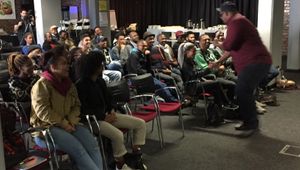
Work Smarter: How to Make the Most Out of Diversity Programs

Diversity has become a much sought-after quality for many in the advertising world, but what resources are actually available to promising young creatives who aren’t from white middle class backgrounds? The One Club's Kevin Swanepoel discusses what the future holds for advertising and design, and expands on the industry’s efforts to evolve into a more inclusive institution.
Q> As we are about to embark on another year of award shows. How do you think ‘creativity’ should be defined in 2016?
Kevin Swanepoel> The context may change, the technology certainly does change, but the principle doesn’t: Creativity, in our industry, is about communicating ideas and addressing challenges in unique ways. Sometimes, creatives in our industry get lost in the novelty of utilizing new-fangled technology to create something with some glitz and glamour, but using technology for the sake of using technology is the antithesis of creativity. The foundation of good creative is always the idea. The tactic follows. An idea is creative, regardless of what media it employs, traditional or otherwise, if it tackles a challenge or approaches a topic from a different perspective, forcing the intended audience to look at something old in a new way.
Q> You’ve been behind many educational/professional development programmes during your time at The One Club. What advice would you give to creatives on the steps they should be taking to invest in their future?
KS> Don’t try to do it alone. I think we’re all guilty of taking on too much from time to time, but as the old saying goes, “Work smarter, not harder.” There are many educational, diversity and professional development programs out there intended to support creatives from all walks of life through the different stages of their careers. The One Club has many such programs, including the Creative Leaders Retreat, a mentorship program; Here Are All the Black People, a multicultural career fair; Creative Boot Camp, which introduces students of diverse backgrounds to the industry; One To Watch, an award for the top creatives under 30; and the Young Ones, a student competition. These are only a few of them. Avail yourselves of these programs. Network. Ask for help. It’s out there. And learn. If you’re not constantly learning something new, you’re moving backwards.
Q> You’re a big advocate of promoting diversification and education in the industry, what would you like to see happen in 2016?
KS> Despite our best efforts, lack of diversity is a persisting challenge in our industry. And while many of our programs receive sponsorships from agencies, to whom we are very grateful, we’d like to see more agencies formalize diversity programs within their agencies. For example, one agency, a long-time sponsor and supporter of our diversity programs, last year instituted a Creative Residency Program through which they recruit and employ professionals of diverse backgrounds from our programs on an ongoing basis. There is a lot of lip service paid to the importance of diversity, but we need more agencies to take action in a systematic way.
Q> You work with companies globally. Is there any territory / country you think are really making waves with how they approach diversification? If so, what should we be taking on board as an industry?
KS> Diversity means different things in different countries and regions. In our London Creative Boot Camp, for example, we had participants from all over Europe of different ethnicities. In our South Africa boot camp, however, it was important to ensure that people of color were well-represented, as South Africa’s population is about 90 percent people of color. In other words, creative teams need to look more like the audience they are trying to reach.
Q> We have to ask about The One Club and The One Show, what are you plans for 2016?
KS> The One Show has become a lot more international in the last decade, and that will be reflected in this year’s awards ceremony as well as Creative Week. Our International Board of Directors, judges, winners and media from about 30 countries will be in attendance.
Q> Global agency budgets for awards are tightening. People are looking to enter the show with the most ‘valuable award’. What do you feel constitutes a valuable award in the current climate?
KS> A valuable award is one that is a challenge to win and one that is respected by your peers. The One Show may not be the destination vacation that some other shows provide, but it is the most challenging to win and one of the most, if not the most, respected awards in our industry. And for the shrinking contingent who still believes The One Show is a U.S. show, The One Show receives the vast majority of entries from outside the U.S. In fact, last year we received entries from 65 countries. It’s also imperative to note that The One Show is produced by The One Club, a non-profit organization that supports the career of a creative from the Young Ones College Competition to induction into the Creative Hall of Fame. In other words, The One Show is the engine that generates revenue that is reinvested into a slew of education, diversity and professional development programs. So, when you enter The One Show, whether you win or not, you’re doing something positive for your industry.















